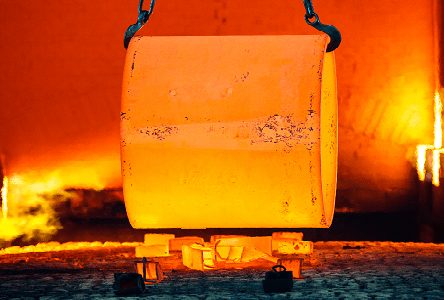 Heat treatment of castings is primarily used to alter the physical, and sometimes chemical, properties of the cast alloy. Many of the mechanical properties of both ferrous and non-ferrous alloys are determined by their microstructure. Heat treatment Is an efficient way of manipulating the crystalline structure of the alloy to modify its mechanical behaviour in a predictable way. Controlled heating and cooling can have an impact on properties such as hardness, strength, toughness, ductility and elasticity although changing the properties of one to achieve a desired outcome will often change another – not always in a desirable direction.
Heat treatment of castings is primarily used to alter the physical, and sometimes chemical, properties of the cast alloy. Many of the mechanical properties of both ferrous and non-ferrous alloys are determined by their microstructure. Heat treatment Is an efficient way of manipulating the crystalline structure of the alloy to modify its mechanical behaviour in a predictable way. Controlled heating and cooling can have an impact on properties such as hardness, strength, toughness, ductility and elasticity although changing the properties of one to achieve a desired outcome will often change another – not always in a desirable direction.
The main heat treatment techniques used by NovaCast are as follows:
- Annealing
The annealing process is used primarily to reduce hardness, improve ductility and relieve the stress built up within a casting during solidification. Annealing improves the machinability of both ferrous and non-ferrous castings. Several different process variations are available for ferrous and non-ferrous alloys, and to achieve different results. These all involve heating the casting to the appropriate temperature for each alloy and then cooling it in a controlled manner. - Precipitation Strengthening
This process is used to increase yield strength of cast alloys including Aluminium, Magnesium, Nickel and Titanium as well as some Steels and Stainless Steels. It works by allowing the controlled release of constituents which form precipitate clusters that considerably increase the strength of the casting. - Tempering
This process is applied to ferrous alloys to achieve greater toughness by decreasing the hardness of the alloy which is usually accompanied by an increase in ductility. The result is that the casting is less brittle. Tempering usually takes place once the casting has been quenched to achieve its maximum hardness and has the effect of reducing the hardness to the desired level. The process involves heating the casting to a point just below that where austenite begins to form and then allowing it to cool. - Case Hardening/Carburising
Carburising is thermochemical diffusion process that introduces a carbon element into the surface of a ferrous casting. This is done by heating the casting above its transformation temperature within a carbon-rich atmosphere. Once quenched, a surface layer is created which greatly improves surface hardness and wear resistance while retaining impact loading performance provided by the softer core. - Normalising
Once cast, Steel alloys will often have a non-homogeneous microstructure which includes large grains as well as other unwanted structural components. These can have a detrimental effect on the mechanical properties and machinability of the casting. Normalising the casting will deliver a more uniform, fine-grained structure with greater mechanical predictability and improved machining qualities. The process involves heating the casting to its hardening temperature before a short soaking period followed by cooling, usually within a protective gas atmosphere which prevents oxidation and decarburisation. - Quenching
Quenching is a process of cooling castings at a rapid rate. In ferrous alloys, this is most often done to produce a martensite transformation that will often produce a harder metal. The casting must be heated above the upper critical temperature and then quickly cooled.Non-ferrous alloys such as Copper, Aluminium or Nickel, however, will usually become softer than normal after quenching. This is also the case with some high alloy steel castings such as Austenitic Stainless Steel (304, 316). In these cases, quenching is needed to make them fully corrosion resistant.
At NovaCast, we are happy to discuss your project at an early stage in the design process to ensure that whatever the alloy selected or post-casting treatment applied, the end-result will meet your mechanical and performance specifications.
To discuss your requirements, call a member of NovaCast’s team on +44 (0) 1225 707466, send us a message here or email sales@novacast.co.uk.